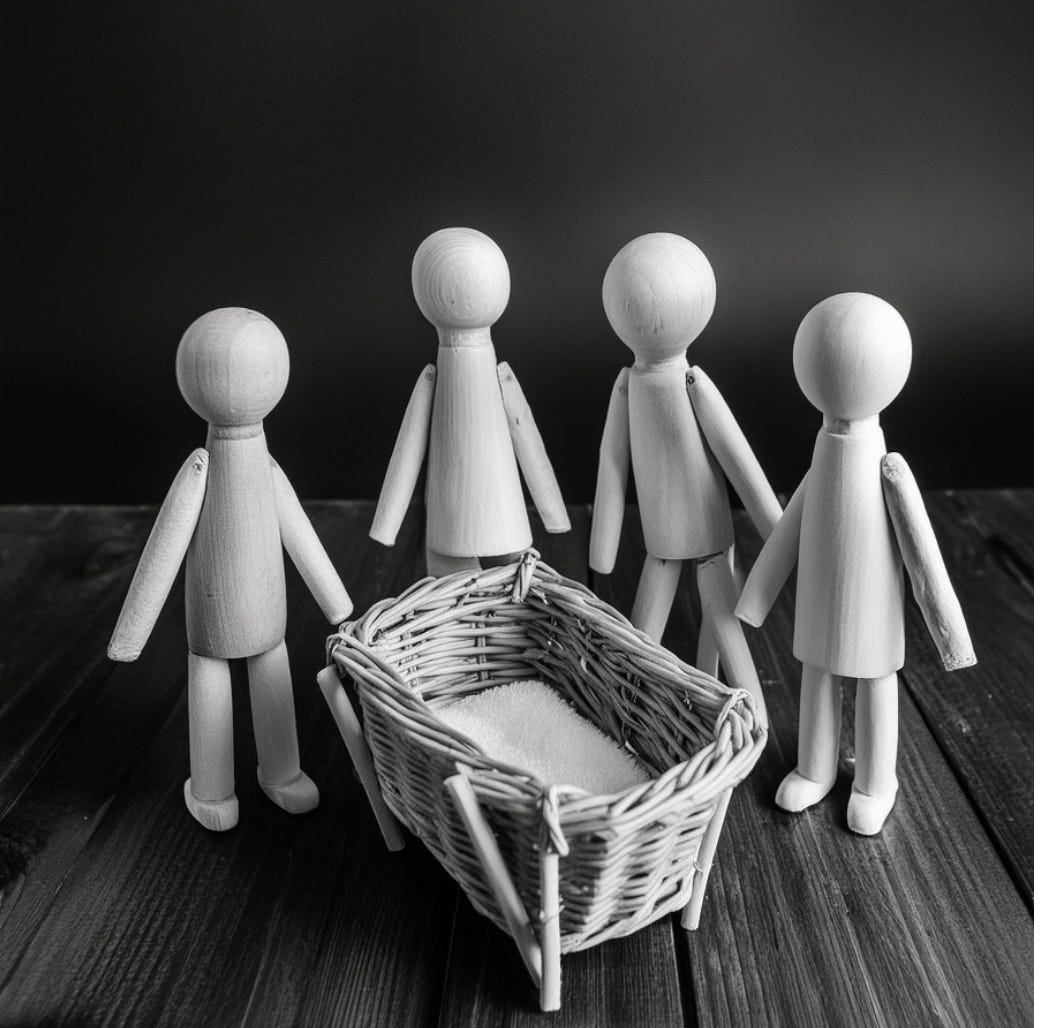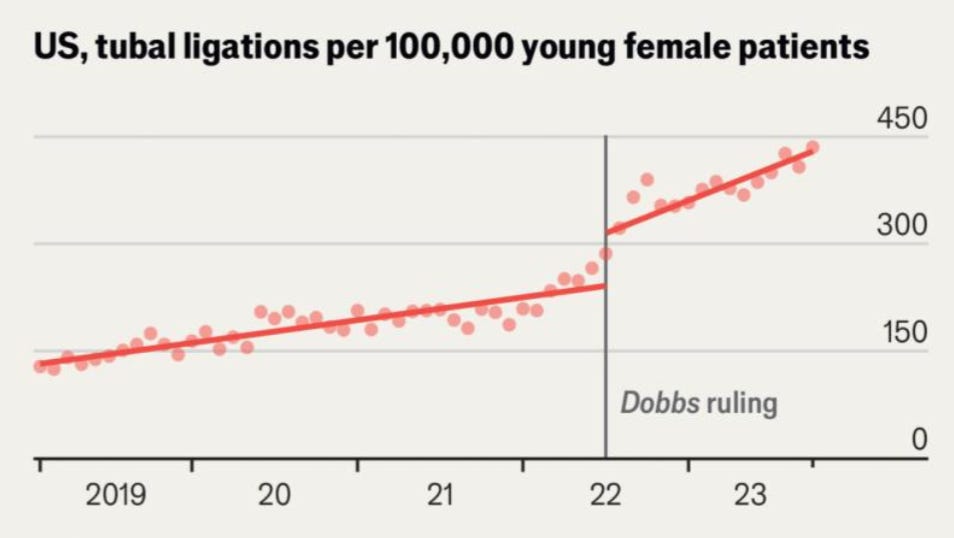Revisiting the baby bust: Is “The Children of Men” prophetic?
May 15, 2024“The Children of Men” is a dystopian 1992 novel by P. D. James about a world in 2021 when humanity is experiencing mass infertility. While we seem to have so far avoided such a dramatic fate, populations seem set to drop in countries across the world, with results that are sure to be surprising.

Back in October of 2020, when we were still grappling with pandemic lockdowns, I speculated on what might happen if the extra stresses placed on women and families led to a baby bust. There was certainly a lot of evidence that this might be an outcome, given that the burdens of the pandemic were disproportionately placed on women and girls.
Helen Lewis, writing in The Atlantic called the period “a disaster for feminism.” Clare Wenham, at the time an assistant professor of global-health policy at the London School of Economics, observed that, “Everything that's happened has been predicted, right? As a collective academic group, we knew there would be an outbreak that came out of China, that shows you how globalization spreads disease, that’s going to paralyze financial systems, and there was no pot of money ready to go, no governance plan … We knew all this, and they didn't listen.”
Concern about falling birthrates isn’t new. Indeed, demographer Philip Longman wrote a 2004 book (“The Empty Cradle”) sounding the alarm about falling birthrates worldwide with fairly apocalyptic implications for how we have set up our retirement, healthcare and educational systems.
Among his more interesting findings is that when televisions, and more specifically the ability to watch hours of home-made telenovelas were introduced to Brazil, birth rates dropped. The plot lines were all about successful powerful men and the beautiful women they had romantic relationships with. Children? Not around or being looked after by nannies. As his article says, “The telenovelas, in other words, reinforce a cultural message that is conveyed as well by many Hollywood films and other North American and European cultural exports: people who are wealthy, sophisticated, free, and self-fulfilled are those people who have at most one or two children and who do not let their parental roles dominate their exciting lives.”
There aren’t enough babies
In a Wall Street Journal article that just came out, reporters Greg Ip and Janet Adamy revisit the population statistics, four years post-pandemic, across the globe. They don’t mince their words: Fertility is falling almost everywhere, for women across all levels of income, education and labor-force participation. The falling birthrates come with huge implications for the way people live, how economies grow and the standings of the world’s superpowers.
Fertility in wealthy countries was less than the replacement rate for the population beginning in the 1970’s. In some countries, such as Korea and Japan, it’s considered a full-on crisis. Italian Prime Minister Giorgia Meloni has prioritized raising the country’s “demographic GDP.”
Despite well-intentioned government efforts, the slide in fertility doesn’t seem to be explained by any of the ‘usual suspect’ elements. Quoted in the Journal, research by Melissa Schettini Kearney, Phillip B. Levine and Luke W. Pardue found that state-level differences in parental abortion notification laws, unemployment, Medicaid availability, housing costs, contraceptive usage, religiosity, child-care costs and student debt could explain almost none of the decline. “We suspect that this shift reflects broad societal changes that are hard to measure or quantify,” they conclude.
Voting with their wombs
Gender and aging expert Avivah Wittenberg-Cox has been saying for a long time that the rise of women’s equality and greater economic opportunity means that for the first time on a mass scale, women have the opportunity to “vote with their wombs.” She argues that country policies are often to blame for women’s increasing reluctance to start or grow families. As she says, “I’d argue that it’s precisely policy that is at fault. It isn’t - anywhere - near ambitious enough. If countries want babies, they’ll need to get far more serious about building more gender-balanced economies, democracies—and couples.”
The solution, in her view, is nothing less than removing the lopsided burden that having a family places on women with personal ambitions. A one-time payment for each child, some reduction of future tax burdens for working mothers and small subsidies in no way make up for the cost, time and risks of childbearing. Policies, she suggests, need to balance gender disparities across the lifetime of work.
With the elimination of abortion protections in more and more places, women are not just electing not to have kids, they’re turning off the baby factories entirely. Here’s a dramatic graphic that shows the consequences of abortion bans on young people’s decision to engage in permanent sterilization:

And how is this for startling – these are young people, ages 18-30! In a world where they feel they might not have a choice about becoming parents, they have cut off their options entirely. US News and World Reports concluded that “Young women in particular had twice the increased rate in tubal sterilizations compared to the rise in vasectomies among young men.” I would imagine that those opposing abortion being legal hadn’t thought through the implications of forcing half the population to bear virtually all the burdens of unwanted childbirth.
If it takes tubal litigation to feel that one is on a level playing field with men, for many young women it seems to be worth it.
Men getting involved and “intensive” parenting
Another theory that I have is that more young men are experiencing how hard it is to look after a newborn by taking advantage of parental leave (that’s good). They, too, are reconsidering the bandwidth and energy it takes to bring children into the world (maybe not so good). I’ve personally been impressed with the involvement of many men in my daughter’s age cohort who don’t just “help out” but actually take responsibility as equal partners in child care. Turns out that when it isn’t just a woman’s problem, the true magnitude of the care burden is suddenly recognized.
Parenting, also, seems to have changed from the standards applied when I was growing up. In our neighborhood, it was completely normal for us to be running around outside without our parents even knowing exactly where we were. Our house was famous for my mother ringing a big gong out the front door when it was time for us to come in for dinner! All the neighbors knew what that meant.
Today, as Jonathan Haidt and his collaborators have pointed out, childhood has gone from an independent, playful activity, to one of formal structures, supervised activities and little spare time. In his book, co-authored with Greg Lukianoff, called “The Coddling of the American Mind,” he laments the rise of “safetyism” in which children are given little opportunity to try things, make mistakes and learn from them, developing critical emotional and intellectual skills along the way.
One of the less noted consequences is that all these organized activities make it even more time-consuming to raise children.
And, just in time to wave Mother’s Day 2024 away, a realistic job interview
If you haven’t seen it, this job interview from a few year’s back humorously makes the point – this parenting thing is really hard.
What are the consequences?
If you listen to the sky-is-falling crowd on the subject of fewer babies, I find it interesting that the negative consequences – less ability to fund pensions, a smaller workforce, less demand, slower growth, abandoned towns, empty villages and so forth – look at consequences almost exclusively at the organizational or systems level. There are system level benefits, too, such as less environmental damage, more resources available for education and individual development and the better outcomes that children from smaller families seem to have in life.
But really, what we have here is another illustration of what Rebecca Henderson might call a market failure in capitalism. If all the burdens are concentrated on individuals and individual families, with benefits accruing to some murky larger system, it isn’t surprising that those bearing the costs would choose not to do so.

